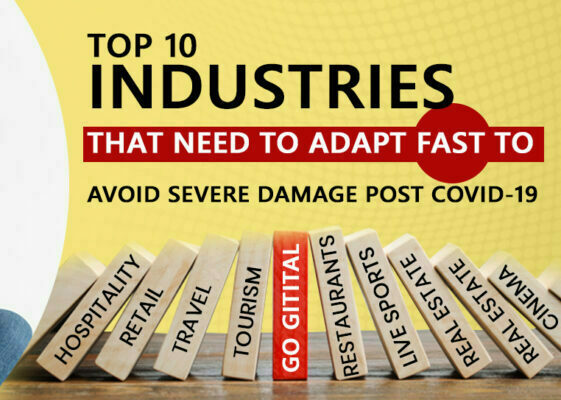
Businesses that balance protecting and running the company today with retooling the business for tomorrow will beat extinction and thrive after the pandemic. For an entire generation of business directors, the actions they take now and in the weeks ahead will define them and their firms. And while the effect of this crisis varies across businesses and regions, it’s no exaggeration to recognize that this time around, the burden of destiny is real. Businesses in some sectors are seeing revenues decrease, and some are confronting the prospect of a liquidity squeeze. Here, is the list of Top 10 industries that need to adapt fast to avoid severe Damage post-COVID-19:
- Retail In many cities retail is already a distressed sector, with declining consumer demand and the threat from discount models. They should optimize their online proposition to make the offer as economical as possible. Limit buying of essential goods to regulate demand and deliver the essentials to the maximum number of customers. Identify which goods are uneconomic to offer through online shopping sites, and merely offer these where the economics make sense.
- Travel Many organizations are already well advanced in their digital journey. This must be accelerated to enable the new normal, help companies to adapt to changed consumer behavior, and rebuild trust. Integrated digital identity solutions are important in realizing touch less travel. The organizations should draw on multiple data points to efficiently assess a person’s risk profile, enabling them to manage risks in real-time. This idea brings together a global consortium of individuals, authorities and the travel industry to facilitate protected and seamless journeys.
- Tourism Social networking with Facebook and Instagram while focusing on good news stories that the state has achieved during Covid-19 should be posted on every online tourism website. Positive video messages by international tourists should be constantly streamlined on the tourism website. Messages on how safe the destination is could be added on Tourism’s Covid-19 webpage along with other guidelines. You should provide visitors to have a chance of visiting tourist destinations virtually from the comfort of the home.
- Restaurants The coronavirus pandemic is forcing all consumers to adopt new habits surrounding dining at restaurants and eating in general. After the pandemic has elapsed, consumers expect to be much less dependent on takeout than they are now. You should provide consumers the ability to track and ensure that the food was within established temperature and storage parameters that will help restaurants ensure top quality even post COVID-19. Restaurants should partake in online consumer awareness exercises to inform diners about the precautions they are taking to ensure that their restaurants are safe.
- Live Sports Canceled stadium events aside, esports’ digital scope has helped shield it from the devastating impacts of the coronavirus pandemic, with the big rights holders in the sector returning to their roots to stream live assistance for millions of fans worldwide. The World Boxing Super Series (WBSS), meanwhile, has also looked to the digital dimension to ease fans by simulating fictional matchups through EA Sports’ Fight Night Champion title.
- Real Estate The real estate fund manager digitally transforms one of its commercial buildings with BuildingOS (BOS) – a cloud-based smart building platform created to eliminate some of the challenges found in buildings. Now, by integrating various Internet of Things solutions and systems, the real estate fund manager BOS centralizes and digitizes all building-related information with big data in a way that can achieve optimized building management operation goals. Through the BOS, clients will be able to control existing equipment with automation and remote access, improving efficiency.
- Logistics Most Businesses and companies are created around delivery models, and post COIVD-19 uncertainties will bring a larger demand for this business as the dimensions of distribution will expand. Boosted efforts to advertise self-sufficiency will lead to growth between regions and territories. Hyper-Local expansion with a stronger development of e-commerce players across multiple categories will play a crucial role. The future of logistics will be covered with high technology adoption and transportation additions would reduce cost and time.
- Cinema The pandemic triggered online entertainment and how some businesses are finding ways to engage in a different way with consumers and the new reality. Musicians are going online and depend on streaming platforms as live shows are canceled. Demand for all forms of media like TV programs, short-form video, music streaming, and online gaming, particularly in geographies currently under stay-home instructions, has risen. Digital transformation in cinema is expecting more new turns in the foreseen future.
- Hospitality While people are not traveling and many hotels are closed, hotels should stay connected with past and future guests through online marketing solutions like social and editorial content that entertains and adds value to maintain a solid brand relationship. Ramp up marketing efforts focused on brand awareness and fueling new guests into the booking funnel with inexpensive CPCs and CPMs to reach people beginning to daydream about rebooking and planning vacations.
- Luxury products Some in the luxury products sector believe the slowdown is just right for companies to reinvent themselves. They can now use this pause in the business to digitize their procedures and improve their systems and technology. This will allow them to create operational efficiencies and provide personalized experiences to the consumers. While most brands are still learning to use live streams to showcase their Autumn/Winter 2020 runway shows, many digital pioneers have carved out their own live stream focuses by primarily using the technology to reach a wide variety of consumers with products.


